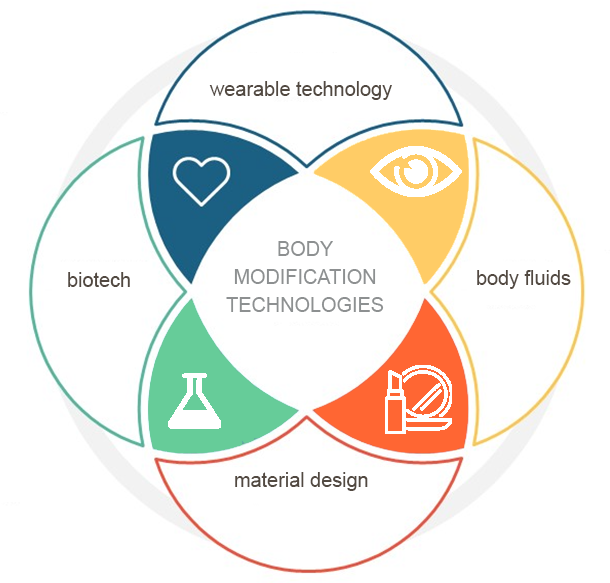CS PhD applicants to IO Lab
New PhD. Student in Human Computer Interaction, Wearable Technologies, Biosensors, On-Skin Interfaces, Design
Are you looking for a CS PhD at UC Davis?
We are looking for a new creative lab member to join as PhD student to our lab!
We would like to work with a student that is independent, not afraid to explore unconventional research areas, passionate about Human Computer Interaction and Wearable Technologies, and work in multidisciplinar environments.
Our research interests include wearable technologies, on-skin interfaces, biosensors and material design. The Interactive Organisms Lab creates novel interfaces in/around the skin, and within bio-organisms are created such as: Beauty Technology (electronics embedded into cosmetics), Body Modification Technologies (biosensors into tattoos or dental orthodontics for health monitoring) and Growable Interfaces (sustainable interfaces through bio-based materials as a substrate for circuitry).
Professor's Bio: Katia Vega is an Assistant Professor of the Department of Design at the University of California, Davis, where She was a Postdoc Associate at MIT Media Lab (USA). She got her PhD and master's degree in Computer Science at PUC-Rio (Brazil). She was a researcher in the Fine Arts Department at HKBU (Hong Kong). Her undergraduate studies were done in Computer Science at UNMSM (Peru). She publishes at top-tier academic computer science conferences and journals including CHI, ISWC, TEI, DIS, IUI and IEEE Computer. Her work has been featured by BBC, Vice, New Scientist, Wired, Discovery, CNN, Fast Company, Mashable, among others. Her academic contributions were awarded by NSF CAREER, SXSW, Ars Electronica, Johnson & Johnson, CNET, among others. Springer published her book: "Beauty Technology: Designing Seamless Interfaces for Wearable Computing”.
Example of projects:
Dermal Abyss: interfacing with the skin by tattooing biosensors https://dl.acm.org/doi/10.1145/3123021.3123039
braceIO: biosensing through hydrogel dental ligatures https://dl.acm.org/doi/10.1145/3410531.3414290
Eslucent: an eyelid interface for detecting eye blinking https://dl.acm.org/doi/10.1145/3410531.3414298
Myco-accessories: Sustainable Wearables with Biodegradable Materials https://dl.acm.org/doi/pdf/10.1145/3341163.3346938
Qualifications:
- Master (preferable) or bachelor in Computer Science, Computer Engineering, Electrical Engineering, Human Computer Interaction or related fields.
- Record of HCI publications (CHI, UIST, TEI, DIS, ISWC, Ubicomp).
- Good communication skills.
- Mandatory experience: wearable computing, digital fabrication, HCI research methods.
- Desirable experience: electrochemical biosensors, chromogenic biosensors, material science, design.
How to apply:
Applications will be review just through the application system to UC Davis - Computer Science.
Deadline: Dec 15th (Applications received after this date will not be considered)
For more information and requirements: https://cs.ucdavis.edu/graduate/prospective-students/how-apply
Documents required:
- Letters of Recommendation
- Statement of Purpose
- Diversity Statement
- TOEFL (80+), IELTS (7+) or Duolingo (115+) Score
- Curriculum Vitae (include links to website)
- Transcripts
- 3.0 minimum GPA
Potential research:
This project investigates Body Modification Technologies: wearable devices for biosensing through novel form factors with embedded biosensors that interact with body fluids. Current practices for body modification include piercing, tattooing, branding, binding, bodybuilding, and inserting implants. By establishing new collaborations with surgeons, cosmetics companies, beauty salons, and dermatologists, this project investigates placing biosensors on and underneath the skin through body modification materials--lipstick, hair dye, piercings, and tattoos. Biosensors in direct contact with body fluids can significantly improve biological sensing data. This project develops new knowledge about methods and effects of transforming the body into a bio-display, in order to make visible information from metabolism that is usually imperceptible. Potential applications include monitoring illnesses, hormonal changes, dental health, eating disorders, stress tracking, pharmacokinetics, maintaining a culture of health in communities, and sensing changes in environmental factors such as pollution, temperature and UV. Further, the project will collaborate with experts on privacy, safety, and biocompatibility to articulate ethical principles for creating Body Modification Technologies.
The Body Modification Technologies project advances wearable computing by developing implementation and evaluation methods to reveal metabolic information by using the form factors of body modifications as a substrate for chromogenic, fluorescence and electrochemical biosensors. This project investigates the design of the electronics, functional algorithms, biotechnology applications, and form factors, e.g., the shape, size, materials, and other physical characteristics that make it possible to wear such devices. Expected outcomes include: (1) fabrication processes for creating the form factors that embed biosensors into body modification materials; (2) design and implementation of hardware and software for devices and mobile applications; (3) dissemination of benchmarking datasets and methods for evaluation of Body Modification Technologies; and (4) derivation of a set of principles and implications on privacy, safety, bio-compatibility, and inclusive design.

For more information, contact Prof. Katia Vega at kvega@ucdavis.edu
